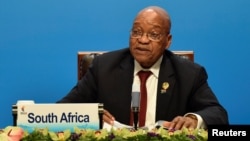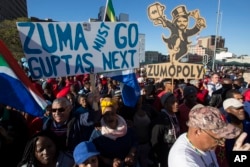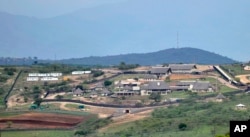South Africa's opposition parties are not giving up on their quest to oust President Jacob Zuma, hitting him Tuesday on two fronts: the nation's highest court and a seating of parliament.
These latest attempts come after Zuma's many long-simmering corruption scandals have provoked the opposition to call eight unsuccessful votes of no-confidence against him. All were handily defeated by the large majority held by Zuma's powerful African National Congress.
On Tuesday, the nation's Cape Town-based parliament shot down a motion from the opposition Democratic Alliance to dissolve parliament to pave a way for early elections. The nation is scheduled to vote in 2019.
Another motion bites the dust
The motion failed to get support from many opposition parties, who agreed that the ANC government had failed to rule, but insisted that the motion to dissolve parliament was irrational, and defeated it by a wide margin.
The ANC rejected the motion as "frivolous" and called it an attempt to undemocratically remove an elected government.
"This motion does not seek to effect governance change, as they claim and want us to believe," the ANC's Richard Mdakane told parliament. "Instead it is more to do with Democratic Alliance trying to effect regime change through clandestine ways that undermine the electoral principles and norms governing the electoral system in our constitutional democracy. These are undemocratic attempts anywhere."
DA chief whip John Steenhuisen argued that the ANC and Zuma have brought corruption, unemployment and suffering upon many South Africans and are no longer fit to rule.
"We can't afford another two years of this government," he said. "South Africa deserves a fresh start."
Court adjourns without ruling
Meanwhile, at the Constitutional Court in Johannesburg, the opposition Economic Freedom Fighters led a bid to persuade the court's 11 justices to rule that South Africa's parliament failed to properly police Zuma's conduct in connection to his use of some $20 million in public funds for upgrades to his rural homestead.
"There is a prima facie violation of Section 89 of the Constitution, to the extent whether the parliament must consider whether or not there are grounds for removal. In this court, in the previous case of secret ballot, this court has already used the term impeachment," argued EFF advocate Tembeka Ngcukaitobi. "So, in summary, what we are asking the court to do is to direct parliament to consider whether the conduct of the president is, prima facie, impeachable."
That section of the Constitution says parliament can impeach a president if two-thirds of its members vote to do so — a tall order, considering the ANC holds 62 percent of the seats.
The court adjourned late Tuesday without a ruling, which will come at a later date, the justices said.
Why now?
Regardless of the efforts against him, Zuma is nearing the end of his turbulent rule. In December, his term ends as head of the ANC and the group will choose a new party leader — a move that will effectively sideline Zuma ahead of national elections in 2019.
But analysts say the opposition's recent efforts are part of a much longer game.
"They need to fight the ANC not only in parliament, but also need to do so in our courts, but also in the court of public opinion," said independent political analyst Aubrey Matshiqi. "What is happening today at the Constitutional Court is part of the broader and multipronged strategy by the opposition to undermine the ANC by making sure that the president's image crisis causes enough collateral damage on the image of the ANC for the opposition parties to benefit in 2019."






